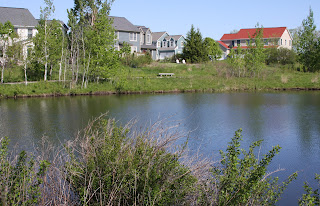Category:
Student efforts to protect water from pharmaceutical contamination head to Brazil
January 18th, 2013 by Irene MilesIISG’s Unwanted Meds program assists DEA’s nationwide drug take-back event
October 2nd, 2012 by Irene Miles Thousands of residents in Illinois and Indiana came out last Saturday with the goal of ridding their homes of unwanted pharmaceuticals as part of the Drug Enforcement Administration’s (DEA) 5th annual National Prescription Drug Take-Back Day. From 10 a.m. to 2 p.m. police officers and volunteers in more than 200 locations in Illinois and 70 in Indiana collected bottles, boxes, and sometimes even garbage bags full of prescription and over-the-counter human and veterinary medications. Everything collected will be properly incinerated by the DEA.
Thousands of residents in Illinois and Indiana came out last Saturday with the goal of ridding their homes of unwanted pharmaceuticals as part of the Drug Enforcement Administration’s (DEA) 5th annual National Prescription Drug Take-Back Day. From 10 a.m. to 2 p.m. police officers and volunteers in more than 200 locations in Illinois and 70 in Indiana collected bottles, boxes, and sometimes even garbage bags full of prescription and over-the-counter human and veterinary medications. Everything collected will be properly incinerated by the DEA.Single-day collection events like this are an important way to limit negative impacts to wildlife and local waterways from prescriptions and medications that are improperly disposed of. A wide-range of pharmaceutical chemicals has been found in rivers, groundwater, and drinking water throughout the country due to medications being flushed down the toilet or thrown in the trash. The impact of these chemicals on long-term human health is still unknown, but a connection between pharmaceutical-contaminated waters and impaired development, behavior, and reproduction has been found in many species of fish and other aquatic wildlife.
IISG has been educating people on pharmaceutical stewardship issues and helping communities establish safe and legal permanent medicine collection programs for more than six years. For additional information on how to dispose of medicine between take-back events or in areas where collections are not available, visit www.unwantedmeds.org.
Kimiko Pettis wins Sea Grant PPCP Stewardship Award for classroom PPCP projects
August 7th, 2012 by Irene MilesLocal water travels a long, long way
June 25th, 2012 by Irene MilesWatersheds are areas where water comes together and drains to a common place. In addition to the streams and rivers and creeks that we can see, though, watersheds encompass a huge range of pathways for water, and your nearby water supply might be part of a very large system that spans multiple states.
“Of course, obtaining sustainable development in town isn’t enough, in and of itself, to guarantee high quality, fishable and swimmable rivers and streams. Industry plays a part; utilities and waste water treatment plants play a part; sensitive farming, ranching, and/or timbering play a part, all in different proportions depending upon the particular watershed in question.”
Sea Grant message reaches many thousands in Times Square — The Movie
April 23rd, 2012 by Irene Miles
In partnership with the American Veterinary Medical Association, the Sea Grant program created a 15-second public service announcement that aired on the CBS JumboTron “Super Screen” on 42nd St. in New York City from late December through March.
Recent News
- Sea Grant Chats: Looking back on our AIS legacy as we move forward
- National Sea Grant welcomes 2026 Knauss Marine Policy Fellowship finalists
- IISG’s new year starts with a new research and reporting coordinator
- Ripple Effects curriculum engages students on the spread of aquatic invasive species
- Coastal communities can tap into IISG resources as they manage beach sand and structures
IISG Instagram
Some partnerships just make sense. Happy Valentine’s Day from IISG! 💕

This February marks a major milestone: 30 years of aquatic invasive species outreach by our team! To celebrate, IISG Director, Stuart Carlton, and Strategic Communication Coordinator, Renie Miles, sat down for a Sea Grant Chat with two key figures in IISG’s AIS history: Pat Charlebois, our assistant director and program leader, who spent over two decades leading our prevention efforts, and Katie O’Reilly, who took over that role in 2022. We discussed the evolution of the invasive species issue in the Great Lakes, the shift toward understanding human behavior, and the creative strategies that make this team so effective.
Dive into the full interview at the link in bio.

Introducing the Lake Michigan Explorer!
Start exploring the varied factors that impact the Great Lakes with our Explorer Series. This searchable database of external resources can help you find hands-on activities that spark curiosity and inspire action.
✨ What’s inside?
Lesson plans, fact sheets, and reading materials
Engaging videos and visualizations
Easy-to-use filters by grade level, topic, and time.
Perfect for classrooms and informal learning, this resource empowers students to become stewards of the Great Lakes.
🔗 in bio for more.

Announcing a Lake Superior immersion for educators! Formal and nonformal 5-12th-grade educators from throughout the Great Lakes states are invited to apply for an exciting opportunity to spend a week aboard a U.S. Environmental Protection Agency research vessel alongside scientists and to bring Great Lakes science back to their classrooms. The program, organized by the Center for Great Lakes Literacy, is July 7-13, 2026, on Lake Superior.
🔗 Apply today at the link in bio.
📅 Application Deadline: February 28, 2026
This program is made possible by Illinois-Indiana Sea Grant and CGLL with funding and support from EPA, NOAA, and the Great Lakes Restoration Initiative.

Categories
- Aquaculture
- Aquatic Invasive Species
- Buoys
- Climate Ready Communities
- Coastal Resilience
- Director's Blog
- Education
- Featured
- Fellowships
- Fisheries
- Funded Research
- Funding
- Great Lakes Cleanup
- Great Lakes Data
- Healthy Waters
- Internships
- Jobs
- K-12 Education
- News
- Photos
- Program
- Recreation & Tourism
- Resources
- Sea Grant Scholars
- Stormwater & Green Infrastructure
- Sustainable Community Planning
- The Helm
- Uncategorized
- Video
- Water Resource Economics



